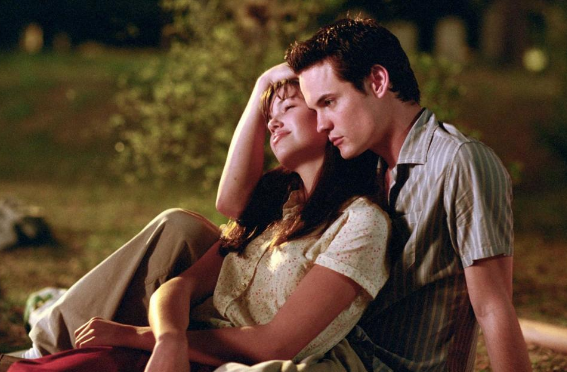Nicholas Sparks has a long-standing relationship with deluding the masses of women. Before his most iconic contribution to pop culture, The Notebook, there was something even more offensive: A Walk to Remember. Released in 2002 and based on Sparks’ 1999 novel of the same name, the Adam Shankman-directed film is exactly what elucidates the problem with why women have such a false sense of reality when it comes to l’amour.
Considering Shankman’s previous films include the likes of The Wedding Planner, his “rose-colored” style is a natural fit for the maudlin, yet heart-melting plot of A Walk to Remember, which first introduces us to “bad boy” Landon Carter (Shane West) as he and his group of ragtag rebellious friends are in the process of hazing a new student by urging him to jump off a water tower. Wanting so badly to be accepted among their so-called ranks, Clay Gephardt (Matt Lutz) literally takes the plunge when Landon pretends that he’ll join him in doing so. After Clay injures himself to the point of making Landon and his lackeys question if he’s even alive, the posse scatters like roaches, leaving Landon as the only one to get caught by the police. Because Clay doesn’t give Landon away for his actions, the principal is merciful toward Landon by offering him the option between expulsion and volunteering for altruistic after school activities, including tutoring and participating in the school play. Both of the aforementioned means constantly encountering notorious milquetoast Jamie Sullivan (Mandy Moore, who had parlayed her way from supporting role in The Princess Diaries to starring role in the span of a year). Her interest in his situation is piqued as she notices his surly demeanor at every event. Wanting to help him have a good time, she offers Landon her friendship by agreeing to rehearse his lines with him (it is, after all, a play that she wrote seemingly with him in mind for the roguish lead).
Going somewhat against the grain, Landon does not immediately succumb to Jamie’s charms, refusing to acknowledge her or their after school relationship in front of his friends when she addresses him publicly. But unlike others, Jamie doesn’t simply cater to Landon merely because he’s “popular,” but rather, cuts him off entirely after he slights her. Afterward, he becomes consumed with finding a way to prove himself to her, happening upon her yearbook (remember those?) photo and finding that her ambition is “to witness a miracle.” He takes the initiative in trying to create one for her by changing his behavior, expressing more of an interest in tutoring, apologizing to Clay and, most importantly, taking his role in the play seriously by avidly studying his lines. The night of the show, Landon surprises Jamie by delivering a flawless performance that includes an impromptu kiss (after a torturously mawkish solo from Jamie).
Everyone in the audience can see what’s happening between them, including Jamie’s father/the local pastor, Reverend Sullivan (Peter Coyote) and Landon’s ex, Belinda (Lauren German). Assuming Jamie will let him in after the moment they shared onstage, Landon goes for her jugular when she doesn’t by insisting, “Maybe you’re scared somebody actually wants to be with you.” Jamie counters, “And why would that scare me?” Capping off the A/B exchange of cheese, Landon suggests, “Because then you wouldn’t be able to hide behind your books or your telescope or your faith.”
It isn’t until Belinda–jealous of Landon’s affections for Jamie–exercises some distinctly early 00s bullying by using the Paint application on the school computer to paste Jamie’s head on to a retrospectively not so scantily clad body with the words VIRGIN MARY? emblazoned underneath it that the relationship shifts. For it is only in this moment that Jamie gives in to Landon’s love by letting him protect her from the shame as he punches out one of his own friends.
From there, it all goes the standard Nicholas Sparks route, with Jamie and Landon’s love seemingly unbreakable after all the obstacles they surmounted–that is, until Jamie finally mentions, “Oh yeah, I have leukemia and I’m going to die before college.” Even The Notebook, with all its similarities in terms of plot structure and “twists,” at least offers a more, shall we say, nuanced sad-romantic ending (perhaps because it isn’t about teenagers getting married).
Of course, the religious element of it also peppers the story with an even mushier slant, spurring on unstomachable quotes like, “I’ll always miss her. But our love is like the wind. I can’t see it, but I can feel it.” And so, once again, A Walk to Remember serves only to accent the point that nurturing, “pure” women like Jamie are as much of a reality as rescuing, reformable, hopelessly romantic men like Landon. The archetypes fortified are dangerously two-dimensional, fostering delusions of love that can’t exist–or can only exist when you know the other party is imminently going to die. And finally, it’s really saying something when even Daryl Hannah is under used in a film, especially with all her rough-around-the-edges cachet (then again, this was pre-Kill Bill).






















